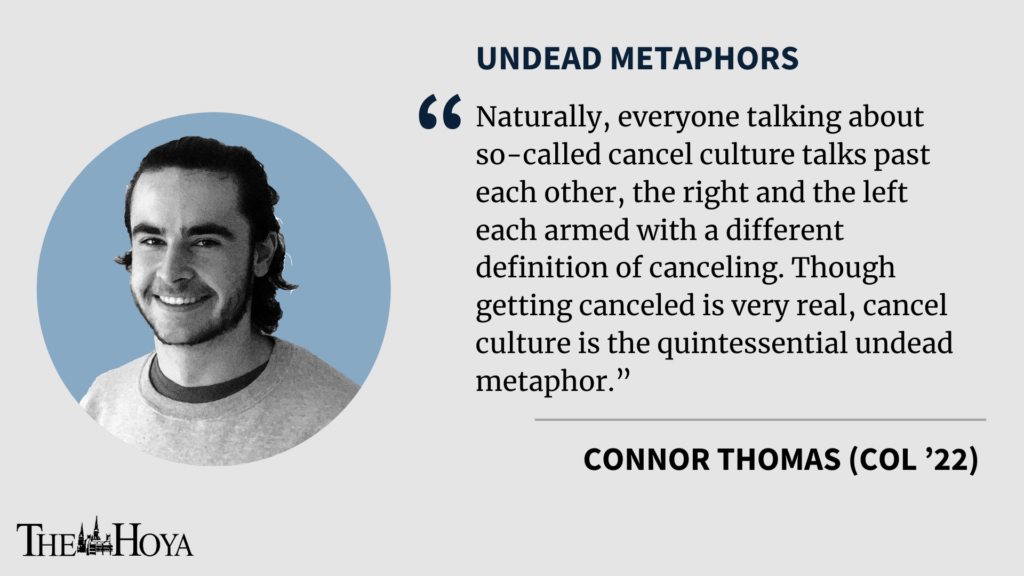Having not yet had the displeasure of suffering large-scale internet ire, I can only imagine what it is like to be canceled. When I try, I think of the famed documentary “Day of the Dead” (1985). In one scene, Dr. Sarah Bowman dreams she is examining an October calendar when dozens of undead hands suddenly burst through it. I imagine many of the internet’s least favorite people felt the same after picking up their phone one day.
Naturally, everyone talking about so-called cancel culture talks past each other, the right and the left each armed with a different definition of canceling. Though getting canceled is very real, cancel culture is the quintessential undead metaphor.
Part of what makes zombies undead, though, is they return again and again. Similarly, undead metaphors like cancel culture will not go away easily. But analyzing competing views of cancel culture can help people figure out how they fit into this phenomenon and give them a path forward.
Many on the right perceive cancellation as an attack that comes from one’s political opponents. Dan McLaughlin in the National Review takes note of an interesting tactic that populist conservatives employ when their ideas come under threat in the public sphere. When social media calls them out for their rhetoric, populist conservatives will typically resort to the classical liberal defense of free speech — the undead metaphors entangle each other — to justify speech or actions that opponents criticize.
Now it looks like conservatives will make cancel culture their main fearmongering culture war talking point in coming election cycles. The Conservative Political Action Conference called itself “America Uncanceled” this year, and Sen. Ted Cruz (R-Texas) continues to complain about a poor free speech climate, presumably in anticipation of coming elections.
But even McLaughlin — himself a conservative — sees how pathetic this strategy is. The better and more honest route would be to argue for the truth and validity of the view itself rather than the simple fact that it should be allowed to be expressed. This honesty would be respectable, regardless of how well the beliefs withstand scrutiny — better to engage on the issues than on the rules of engagement.
But often these conversations remain on the level of the rules of engagement, because left-wingers either see the right’s motives as disingenuous or disagree about what cancel culture refers to. Fewer people on the left see cancellation as something bad, and I would hope everyone sees its positive potential to deplatform or fight oppressive people who enforce broken systems.
But cancellation is not a punishment. Instead, it describes the underlying mechanism of a punishment, which usually involves losing a job, contract or other platform. Cancellation occurs when a public figure’s actions foment anger online, building enough momentum to pressure a company or other powerful institution to hand down an extralegal punishment.
This sounds very democratic, and it would seem to be an appealing way of doing justice if social media were a reliable sphere of debate — but it is not.
Social media, because it is a place for shitposting rather than rational debate, cannot try criminals effectively. The two biggest problems this creates are, first, a lack of proportionality in punishments, and second, an unclear path to redemption. There is an element of compassion lost in the online conversations that pundits label cancel culture.
Much has been made of former Axios reporter Alexi McCammond losing her position as Teen Vogue’s editor in chief over past racist and homophobic tweets and whether her comments were forgivable teenage gaffs or whether they disqualified her from heading a major media publication.
Many mainstream journalists, including current Axios political reporter Johnathan Swan, came to McCammond’s defense, accusing the country of lacking forgiveness. However, it is not Teen Vogue’s job to forgive; the company needs the best figurehead to represent its values. The forgiveness that pundits critical of Teen Vogue’s decision would like to see would happen on social media.
Unfortunately, shaming others is nothing new, and it will likely be difficult to ever eliminate it. Screaming at a — practically inevitable — phenomenon that happens online might be a sign of insanity, so I won’t focus all of my energy on this one. The less vain, more productive approach is petitioning people to approach trends like these more thoughtfully.
People who would participate in canceling others online should interrogate their own motives. In general, criticism should always be for the person being criticized, yet too often, we criticize each other to win an argument or signal our moral superiority. But what we really gain by dunking on fellow humans is likely no more than fleeting schadenfreude or ad revenue, especially revenue for the tech companies hosting the outrage.
The point of feigning surprise at others’ moral failures quickly loses its luster. This shift in perspective invites a more productive conversation, one that would hopefully be educational for at least one offender and one that would not make an outcast out of them.
The muddy trend called cancel culture is here to stay, meaning that we as individuals have a choice as to whether to become undead hands.
Connor Thomas is a junior in the College. Undead Metaphors appears online every other Friday.















Orlando • Apr 5, 2021 at 9:45 am
Well written article that makes some great points, especially regarding the internet that “There is an element of compassion lost in the online conversations that pundits label cancel culture.”
Except in extreme cases, there should be a route to redemption for people who make ignorant statements but show they can learn from it.
psamp • Apr 2, 2021 at 11:48 pm
“teenage gaffs” lol. this is a poorly written column, and i have to ask why it was written. no one reads this paper, or cares what a college kid thinks. moreover, it seems to argue against the principle of free speech [hurr durr, people should debate substance not the right to speak!!] which is amusing. completely moronic.